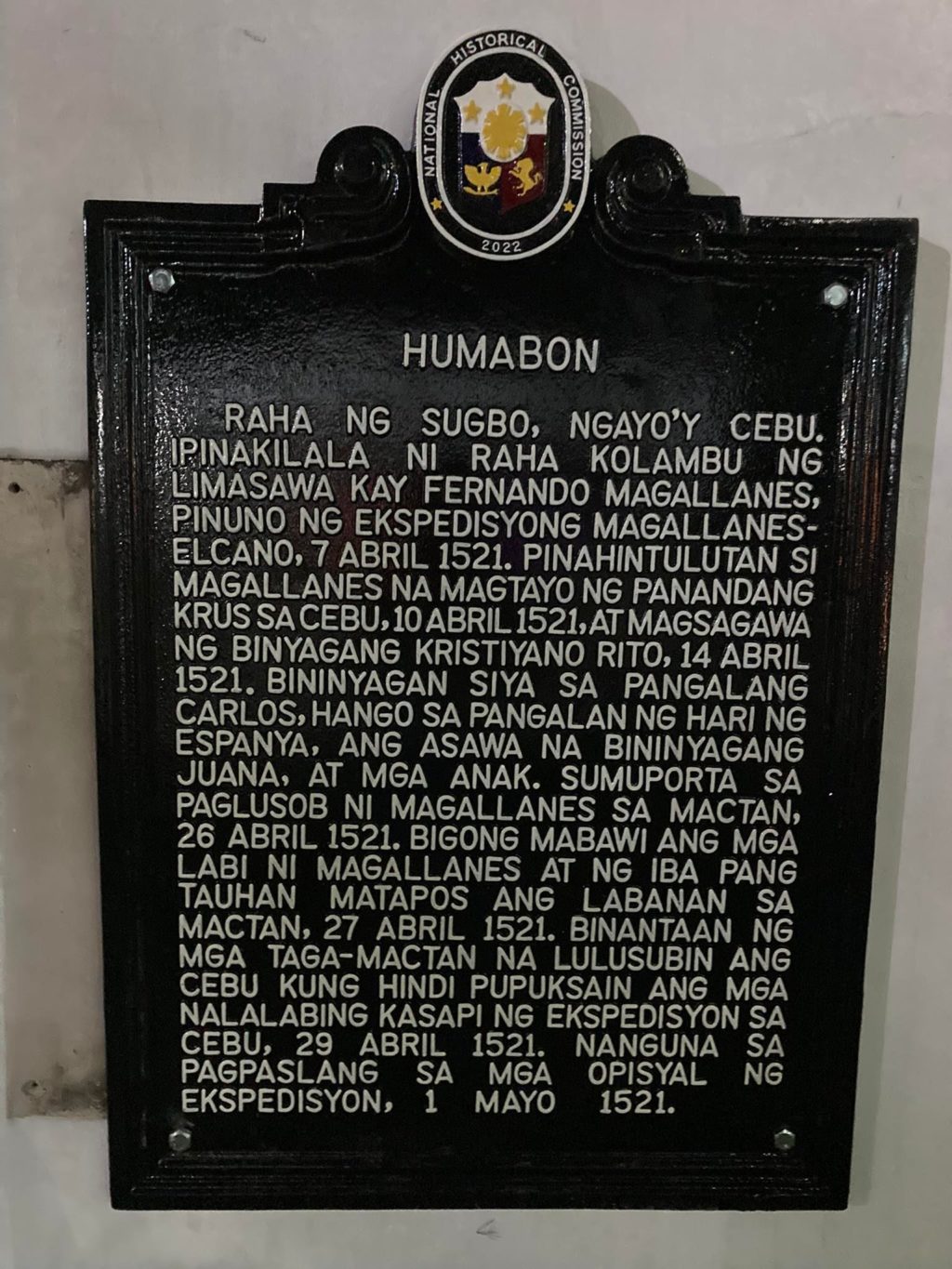
Here is a closeup photo of the unveiled historical marker of Rajah Humabon. | Mary Rose Sagarino
CEBU CITY, Philippines — A historical marker in honor of Rajah Humabon, the first chieftain to embrace Christianity in the country, has been installed at the Rajah Humabon Monument at P. Burgos St. in Cebu City, on Monday night, May 23, 2022.
Dr. Rene Escalante, chairman of the National Historical Commission of the Philippines (NHCP) and executive director of the National Quincentennial Committee, led the unveiling of the historical marker.
Cebu City Mayor Michael Rama, on behalf of the City government, accepted the historical marker in the presence of Cebu City Vice Mayor and incoming City Councilor Dondon Hontiveros and Alvin Alcid, deputy executive director of the NHCP, who served as witnesses for the signing of the Certificate and Acceptance of the historical marker.
The unveiling of the historical Humabon marker is still in line with the country’s Quincentennial commemorations.
Rajah Humabon was the King of Cebu at the time of Ferdinand Magellan’s arrival in 1521.
The arrival of the Magellan-Elcano fleet on the shores of Cebu on April 7, 1521, and the warm welcome given to them by Rajah Humabon paved the way for Christianity to enter the island.
Rajah Humabon was instrumental in converting Cebuanos to Christianity, particularly his wife, Queen Juana, who chose to receive the image of Sto. Niño.
This is the historical marker of Rajah Humabon that was unveiled today, May 23 at the monument of Rajah Humabon. | Mary Rose Sagarino
Though the City government of Cebu already placed a local marker, Escalante, during the supposed closing of the Quincentennial celebration and as the city remembered the Rajah Humabon Day last April 7, promised that he would give the monument a historical marker.
Escalante said it would be more dignified if the NHCP would be putting a historical marker rather than just a local marker, which the City had already put in Rajah Humabon’s monument.
NHCP installs markers in the country and places abroad which signify important structures, persons, institutions, and events in the country’s local and national histories.
“With this, this monument and this site will now be protected by the Republic Act 10066 otherwise known as the Heritage Law. Any development in this site will now be supervised by the cultural agencies,” he said.
“Hindi naman pinagbabawal. Kaya lang minomonitor lang in order to make sure that the development plans are compliant with the heritage law,” he added.
Escalante said the positive indication of having a historical marker was that the state now would be duty-bound to protect the Rajah Humabon monument and it would allow the local and the national agencies to appropriate funds for its restoration and upkeep.
He also said that his office would also inform the Department of Tourism and its regional offices that the NHCP had considered Rajah Humabon’s monument as a historic monument so that not only the cultural agencies, but the government’s tourism sector as well would help promote and develop the site.
During his acceptance speech, Rama thanked Escalante and the NHCP for making this historical event in the city possible.
Cebu City Councilor Joel Garganera and City Administrator Ma. Suzanne Ardosa, and some commissioners from the City’s Cultural and Historical Affairs Commission and the City’s Cultural and Historical Affairs Office also attended the unveiling ceremony.
While a thanksgiving dinner and Cultural Show of the 2021 Quincentennial Commemorations in Plaza Independencia followed.
RELATED STORIES
Msgr. Rudy Villanueva to receive Order of Rajah Humabon Award
Archdiocese of Cebu priest nominated for National Artist Award
On Rajah Humabon Day: ‘Facts have to be retold’
/dbs

